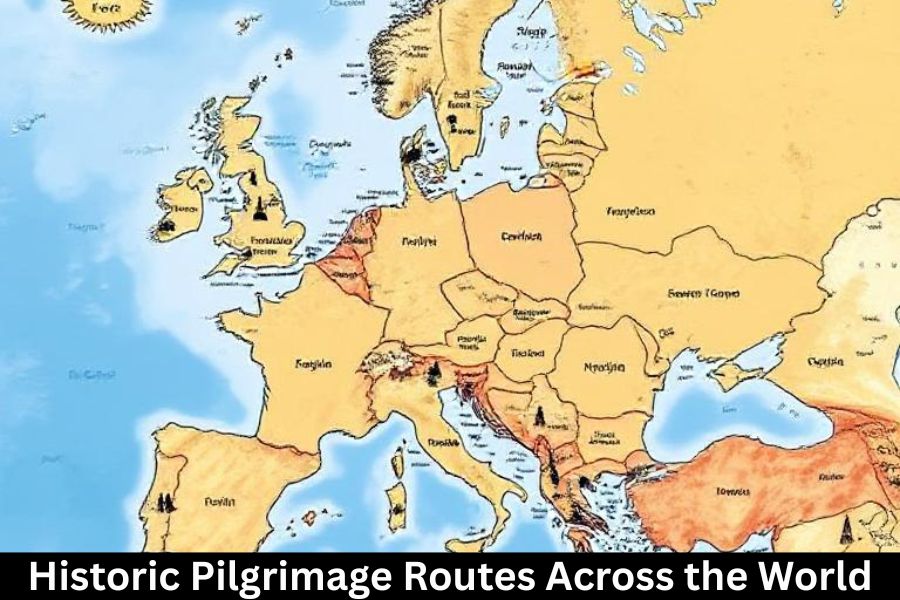
Throughout history, people have walked long and challenging routes—not for fame or luxury, but for faith, peace, healing, and self-discovery. These journeys, known as pilgrimages, connect travelers to ancient traditions, spiritual wisdom, and breathtaking landscapes. Even today, millions of people walk these historic paths to seek meaning and reconnect with something deeper than everyday life.
The Meaning of Pilgrimage
A pilgrimage isn’t just a trip—it’s a transformation. It’s a journey inward as much as outward.
Why Pilgrimage Routes Still Matter Today
In our fast-paced world, these ancient trails offer stillness, reflection, and a sense of belonging.
What Makes a Pilgrimage Route Historic?
Cultural and Spiritual Significance
Each route carries centuries of worship, tradition, and ritual.
Ancient Trade and Religious Paths
Most pilgrimage routes were once vital trade paths or sacred roads.
The People and Stories Behind Them
Every step holds the memories of those who walked before—leaders, monks, saints, and seekers.
Camino de Santiago, Spain
The Way of St. James
One of the most famous pilgrimage routes in the world, dating back over 1,000 years.
Key Routes and Their Importance
- Camino Francés
- Camino Portugués
- Camino del Norte
Each leads to the Cathedral of Santiago de Compostela.
Landmarks Along the Trail
Medieval churches, Roman bridges, charming villages, and stunning landscapes.
Kumano Kodo, Japan
UNESCO World Heritage Pilgrimage
One of only two UNESCO-recognized pilgrimage routes globally.
Sacred Shrines and Forest Trails
The trail connects three grand shrines—Hongu Taisha, Hayatama Taisha, and Nachi Taisha.
Spiritual Traditions
Shinto-Buddhist rituals, ancient forest pathways, and peaceful hot springs.
Hajj Route to Mecca, Saudi Arabia
One of the Most Significant Pilgrimages
For Muslims worldwide, the Hajj is a sacred duty performed at least once in a lifetime.
Historical Caravan Routes
Routes like the Darb Zubaydah guided travelers through deserts and mountains for centuries.
Cultural and Religious Practices
Pilgrims perform rituals symbolizing unity, equality, and devotion.
The Inca Trail, Peru
Ancient Path to Machu Picchu
A breathtaking trek through cloud forests and ruins.
Mystical Landscapes
Steep mountains, lush valleys, and sacred Inca sites.
Cultural Legacy of the Inca Empire
Every step reveals the engineering mastery of the ancient civilization.
Mount Kailash Kora, Tibet
Sacred to Multiple Religions
Revered in Hinduism, Buddhism, Jainism, and Bon.
The Trek Around the Holy Mountain
A demanding 52 km circuit that symbolizes purification.
Rituals and Symbolism
Many believe completing the kora cleanses one’s past karma.
Via Francigena, Europe
From England to Rome
A 2,000 km medieval trail beginning at Canterbury Cathedral.
Medieval Heritage
Walkers follow the steps of pilgrims heading to the Vatican.
Architectural and Cultural Stops
Cathedrals, monasteries, small hamlets, and scenic countryside.
St. Olav’s Way, Norway
The Legacy of St. Olav
A tribute to Norway’s patron saint.
Nordic Landscapes and Tradition
Forests, lakes, mountains, and ancient farms.
Key Sites Along the Journey
The route ends at the stunning Nidaros Cathedral.
Adam’s Peak, Sri Lanka
Sacred Footprint Shrine
The summit holds a footprint believed sacred in Hindu, Buddhist, Christian, and Islamic traditions.
Religious Harmony
People of all faiths climb together.
Sunrise Trek Tradition
Watching the sunrise from the peak is an unforgettable moment.
The Pilgrims’ Way to Canterbury, England
Medieval Christian Route
A famed trail since the 12th century.
Canterbury Tales Influence
Chaucer immortalized this pilgrim journey in literature.
Historic Cathedrals and Villages
Quaint English villages, rolling fields, and Gothic cathedrals.
Paddington’s Route to The Golden Temple, India
Sikh Pilgrimage Legacy
Travelers walk toward Harmandir Sahib for peace and blessings.
Cultural and Spiritual Symbolism
Langar, seva, and hymns reflect the heart of Sikh teachings.
The Golden Temple Experience
A spiritual sanctuary with mesmerizing architecture.
Why People Still Walk Pilgrimage Routes Today
Self-Discovery and Reflection
Pilgrimage is a chance to slow down and reconnect with your purpose.
Adventure and Exploration
From mountains to forests, these routes offer unforgettable landscapes.
Cultural Connection
Travelers meet people from diverse backgrounds, sharing wisdom along the path.
Tips for Modern Pilgrims
Planning Your Route
Research climate, difficulty, and accommodations.
Packing Essentials
Carry only what you need—comfortable shoes, water, layers, and first-aid.
Respecting Local Traditions
Dress modestly, follow rituals respectfully, and protect heritage sites.
Conclusion
Historic pilgrimage routes are more than paths—they’re living stories. They connect cultures, preserve traditions, and offer a profound journey that touches the soul. Whether you’re seeking spiritual growth, cultural insight, or simply adventure, these ancient trails offer life-changing experiences. The world may be modern, but the magic of pilgrimage endures.
FAQs
1. Which pilgrimage route is best for beginners?
Camino de Santiago offers well-marked trails and comfortable facilities.
2. What is the most spiritually significant pilgrimage?
The Hajj to Mecca is considered one of the most sacred in the world.
3. Are pilgrimage routes safe?
Most are safe, but preparation and awareness are essential.
4. Can I walk these routes alone?
Yes, many pilgrims travel solo for deeper reflection.
5. What’s the best season for pilgrimage travel?
It varies—spring and fall are ideal for most routes.
